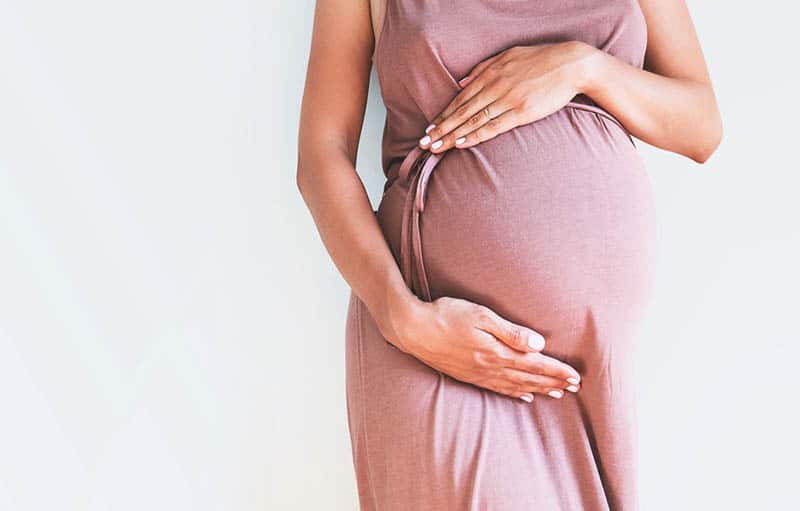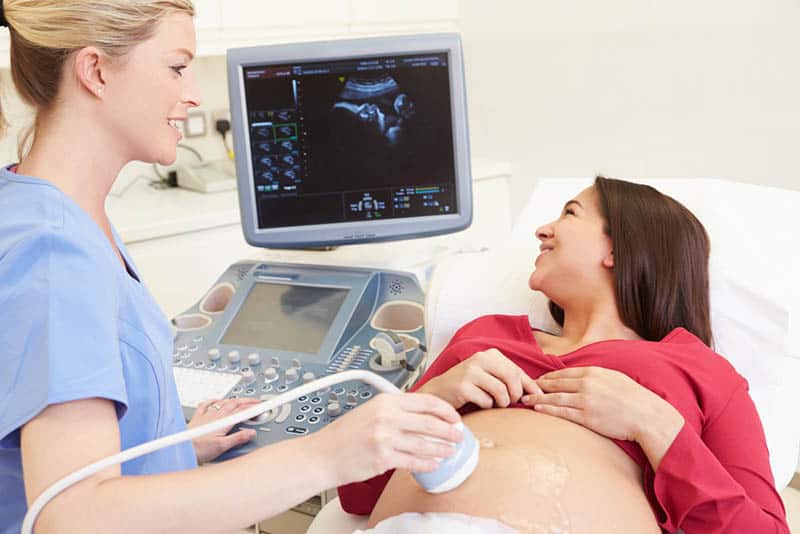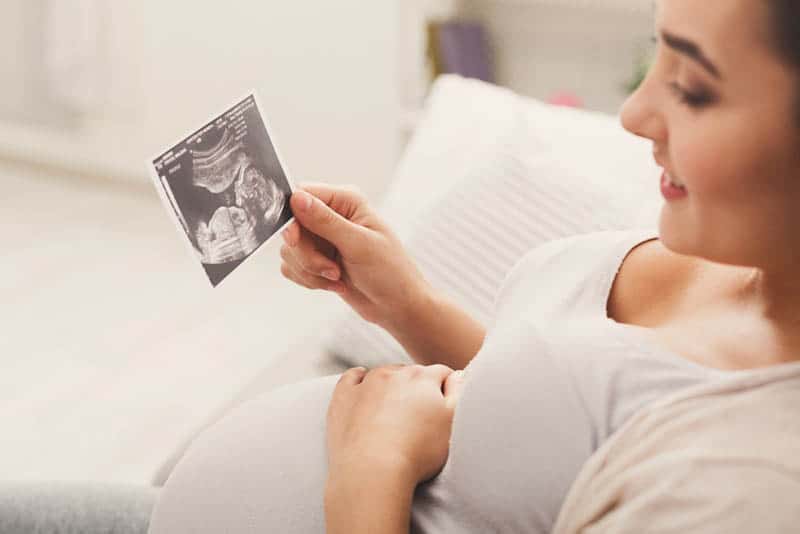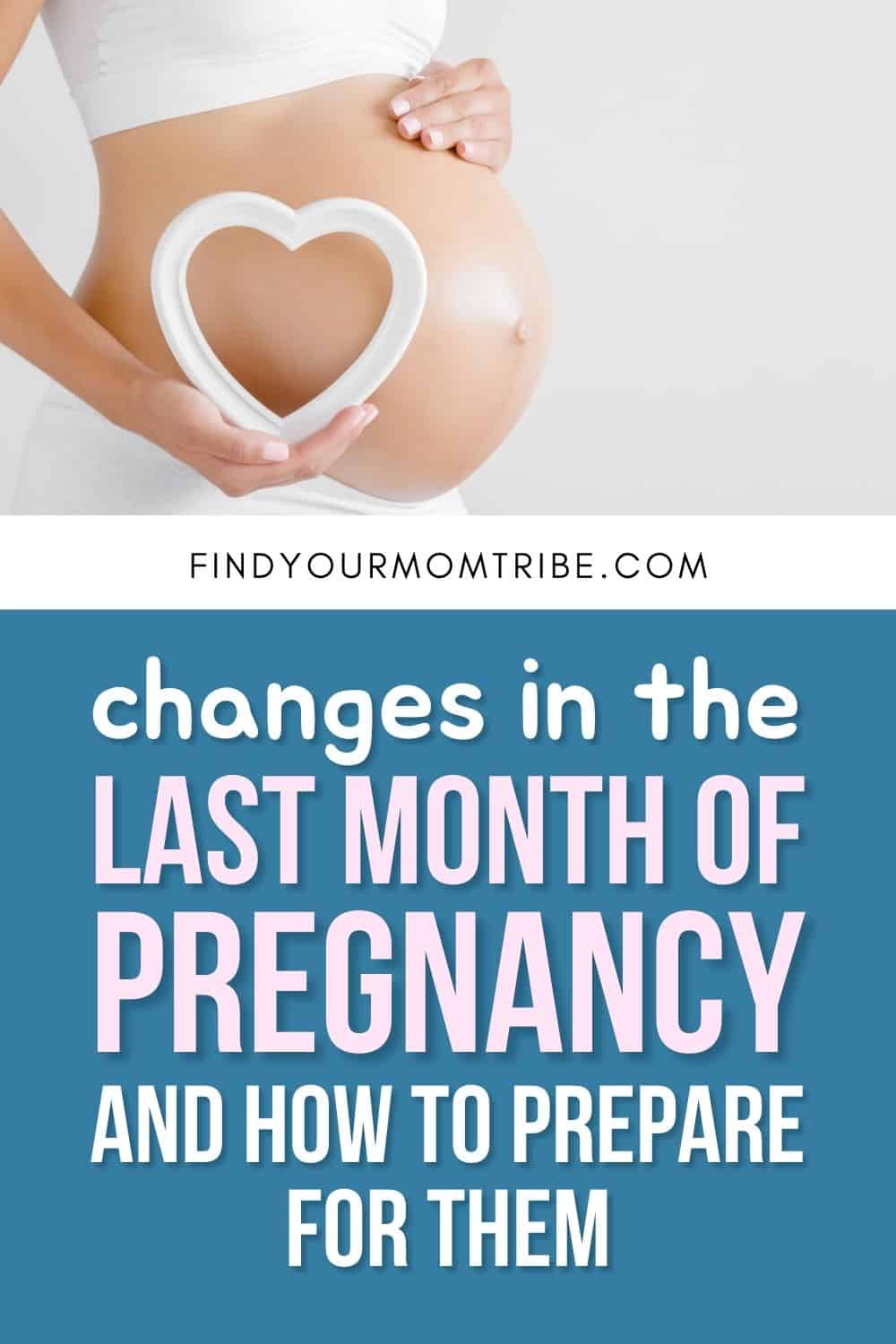The last month of pregnancy is arguably the most anxiety-ridden one.
It’s late into the third trimester, your nerves are likely spiking with both anxiety from the waiting and worry whether everything’s going to be okay when your due date finally arrives.
Every mom’s been there and it’s no picnic, but it’s not all filled with the bad stuff either.
During the third trimester, you get to watch your baby develop rather quickly, turning from what used to be a mere fetus to a full-on newborn child in a span of a few months.
Your tummy also gets bigger and, as your uterus expands, you’ll feel like more water than woman as the relaxin hormone loosens your ligaments to further accommodate the body for the baby’s delivery.
There are some problems that might occur during these last weeks of pregnancy as well.
We have to be on the lookout for things like heartburn, short periods of fatigue, backaches and shoulder aches, as well as the expected abdominal pain.
Mind you, these are all part of the natural process and should disappear once your little one is delivered into this world, but it’s important that you’re aware of them and how to deal with them.
And, naturally, you should be on the lookout for your waters breaking as you approach your due date, and any other signs that you’re about to head into labor.
This is what we’re here to explore this time around by going through some of the most important aspects of your third trimester.
When Are The Last Months Of Pregnancy?

These are usually counted from week 28 onward and go on until about week 40. This period is what we call the third trimester.
Throughout months 7 and 8, and part of 9, your child will be undergoing final preparations inside your womb concerning his/her physical developments before they are ready for this world and, in the last week or two, your baby will start notifying you that they are ready.
This is the time where you’ll start going into labor and begin having contractions.
RELATED: What Do Contractions Feel Like And How To Recognize Them
The period when this happens can vary from anywhere between a week or two before, to a few weeks ahead.
Should labor not kick in until two weeks after the projected due date, you’ll be flagged as overdue and likely brought in to the hospital so the doctors can artificially induce labor.
What’s Happening To The Child During The Last Month Of Pregnancy?
Well, despite it being the home stretch of the pregnancy period, there’s still a lot that has to be done inside the womb to finalize the baby’s growth.
The weight that the baby has accumulated throughout the first and second trimester, but this is nothing compared to the rapid weight gain and overall growth during the last trimester. But, how much weight does a baby gain in the last month of pregnancy?
He’ll go from the 2-3 pounds and about 15-17 inches in length to somewhere like 7-10 pounds and just a bit over 20 inches by the time the full term is done and the baby is ready for delivery.
The size and weight increase aren’t the only things going on in your uterus, there are plenty of other things that occur during this period.
1. The development of cognition

One of the most important things that develop during this period is mental capability.
The child’s brain will start developing some of the most basic functions like the ability to dream, blink and regulate his/her own body heat so they don’t have to rely on the womb for warmth anymore.
2. The development of the five main senses
Apart from mental development, the next most important thing are the five key senses: sight, touch, smell, hear and taste.
This usually happens around the 30th week where your baby begins to react to different light levels and is able to react when you talk to him/her.
They can even taste the different foods that you consume, though that one’s a bit harder to notice unless he/she really disagrees with some of it and you get a tiny little kick against your belly.
3. The bone structure starts developing

This process starts happening at the start of the third trimester when the flexible cartilage starts turning into bone, and the baby starts absorbing the calcium from your own body.
This is why it’s rather important to increase your calcium intake during the last trimester, to get your child’s bones strong and prepare him for the big day.
4. The development of his digestive tract
The last month of pregnancy is also characterized by the baby’s development of a proper digestive tract.
And this is noticeable when the meconium forms, also known as the baby’s first poop. It’s made from vernix, lanugo and the baby’s blood cells.
5. The growth of skin as well as hair and nails
During that last month, the one other important bit that happens is the development of the “final coating”, so to speak, as the baby’s skin develops fully, and the body turns more opaque than translucent.
The next step is that the hair and the nails start growing as well, while the vernix and the lanugo are shed from the child; the protective layers that served as a buffer between the child and the uterus.
They are replaced by the growing amount of fat that helps fully form the child’s body.
6. The changing position

As the big day arrives, the baby will start turning over, his head down, his legs up: – the optimal position for delivery. This usually happens a week or so before month 9 of pregnancy.
What Happens To The Mother’s Body During The Last Month Of Pregnancy?
Your child isn’t the only one who’s going to go through some changes. Your body is still a minefield of hormones going off left, right and centre, causing all sorts of trouble.
In saying this, some of them are simply going to happen due to the added strain too. Plus, there are other potential complications outside of these, but outlined here are just the most commonly occurring ones, and they are:
1. Fatigue
Because your baby is undergoing some rapid growth and development, they’ll need a lot more nutrition.
Nutrition that they’ll be drawing straight from your body, leaving your batteries emptier than before, meaning you’ll have to up your food intake to keep up with the increasing demand.
However, you’ll also need to get some more rest in and try to not waste your energy by doing stuff that puts a strain on your body.
You deserve the rest anyway, ask others to help out a bit during this last bit until you reach the home stretch.
2. Heartburn

A very common and annoying aspect of the final weeks of pregnancy is heartburn. It becomes worse the more the uterus expands and some of the contents of your stomach get pushed up the esophagus.
This leads to that unpleasant acid reflux burn in your throat and around the heart.
Luckily, it’s easy to deal with if it becomes too much of a bother during your pregnancy through the use of H2 blockers and PPIs (proton pump inhibitors).
3. Bladder incontinence
Due to the hormone relaxin loosening your pelvic area, and the increasing weight of the baby pressing down on your pelvic floor, your bladder control will severely deteriorate.
Don’t be surprised if you leak on occasion, it’s usually nothing worrisome. Just make sure you have enough absorption down there in case you sneeze and have an accident.
4. Shifted center of gravity
As your baby grows and your pregnant belly expands, you’ll start noticing that you’re walking a bit more clumsily than usual.
There are two reasons behind this. The first one being the more obvious, where your body’s center of gravity shifts due to the extra weight and you simply are not accustomed to it yet so it keeps you off balance.
The second reason is tied to a similar culprit to that causing bladder incontinence, and that’s relaxing, or rather the joints being loosened due to the effects of relaxin which make you feel like you’re a walking water balloon with how liquidy every part of your body feels.
5. Lactation from the breasts

On occasion, you might get a few leaks in the breast area as well as some of the breast milk spurts out.
Don’t worry though, it’s simply your body being a bit too excited about the new baby, just as much as you are. Think of it as getting ready to start breastfeeding your little angel the moment he/she comes into your arms.
6. Bodily aches
Aching in your back, and abdominal and shoulder pain, are all a part of the process of pregnancy, especially during the last few weeks.
Again, relaxin is to blame for your woes there in most cases, causing these areas to become sore and achy due to a lack of firm support.
The lower back, especially as the spine adjusts a bit, shifts into more of an S shape to help the body handle the added weight of the child without compromising a pregnant woman’s stability so she doesn’t throw her back out.
7. Varicose veins
If, all of a sudden, you’re starting to notice that the veins in your lower body, especially around your thighs and calves, are starting to appear through the skin, as well as seeming larger than they’re supposed to be, don’t fear.
It’s usually all a natural part of pregnancy due to your blood vessels expanding and your body essentially pumping for two until the big day.
They should disappear shortly after the birthing process finishes. If they don’t, you might want to seek medical advice from a doctor or any other qualified health care provider on the matter.
8. Braxton Hicks contractions

Also known as false labor, these contractions appear as a side effect of hormonal activity but aren’t representative of the actual contractions that you’ll feel during labor.
These happen a bit earlier, serving as a sort of prep test before the real thing starts so you can detect it easier, so don’t start panicking if you start feeling contractions coming along earlier than expected, as they’re more than likely to be the Braxton Hicks ones.
You’ll be able to tell the difference because these prep ones are less intense than the real thing, at least they’ll start off as such before they gradually start ramping up in intensity.
9. Stretch marks
A growing belly means further stretching of the skin which is likely to leave stretch marks.
The best visual representation of them would be trying to imagine stretching a thin layer of gum across four corners and seeing the thinner surfaces start to tear somewhat.
But, trust me, if you get them, they’re hard to miss.
They’re likely to stay around for a bit, but through proper self-care of your skin and the use of several moisturizers, their appearance can be lessened to an extent.
10. Anxiety and mood swings
The biggest troublemakers during this final period on your end are undoubtedly going to be these two.
The other symptoms might come and go, but the mood swings can make it a nightmare for you or your partner if the hormones spike a bit too high.
On the other hand, anxiety is a real nasty one, making your stress levels spike and causing even further disarray in your body and potentially leading to all sorts of complications.
It’s the mix of excitement and panic of the due date coming and you becoming a parent to a new baby, and it can be a real strain to deal with at times.
As you can see, there’s quite a bit going on during the third trimester, especially during the last month of pregnancy, so much so that a pregnant mother is likely to need help with a few things near the end of the pregnancy itself.
What To Be On The Lookout For?

During the last month of pregnancy, you should start paying attention to the signs of oncoming labor as the baby is likely to start knocking on your cervix door any day now.
The most common signs are:
• Lightening – A sign I had mentioned earlier, lightening is the event that describes your baby dropping down to the pelvis and signaling the completion of his prenatal prep. It serves as a good early warning that real labor is about to start soon.
• Discharging the mucus plug – This plug serves as a seal on the uterus to protect it from any outside influences until the baby is ready to go and is another good sign that contractions and labor might start-up real soon.
• Contractions – Speaking of which, when you get contractions that start off strong and keep getting stronger, you’ll know that you’re hitting real labor and not the false labor indicated by the milder Braxton Hicks contractions.
• Your waters break – This one is somewhat variable. While most women have their waters break at home, sometimes they don’t, and a doctor in the hospital instigates the process.
And, if they don’t break, it’s no big deal, it’s just an extra step to the whole process that doesn’t take too long.
These are the good signs, however. But, as with anything good, there are always some bad signs too that might indicate a complication, or that you have a baby in distress.
These include:
• Any form of sudden weight gain
• High fever
• Heavy vaginal bleeding
• An increasingly sharp pain in your lower abdomen
• Any signs that might indicate preterm labor starting up
All of these, as well as anything else that might appear concerning, warrant an immediate appointment with your doctor for medical advice on the matter and treatment of a potential problem.
Make sure to stay vigilant.
How To Handle All These Changes?
Dealing with all these changes in the last month of pregnancy can be a complete nightmare at times, with how overwhelming it might end up getting if everything is happening all at once.
1. Stay calm
Keeping your cool is the most important factor with anything in life, especially with things concerning your health and the health of your baby as well as his upcoming arrival.
The more you keep your stress in check, the better you’ll be able to handle everything that gets thrown at you.
2. Don’t do anything too strenuous
Remember, you’re in a more fragile state now than you are normally, so you shouldn’t risk any complications.
This means not trying to lift anything heavier than the weight of your future child and taking things easy.
3. Don’t get too complacent

As important as resting is, staying active is too. You need to keep yourself in an okay shape so you don’t add any extra health risks to the already lengthy list mentioned above.
You don’t have to resort to heavy exercise as that’ll just end up being too strenuous and will clash with #2. Just doing your daily 2 miles is enough as long as you watch what you eat.
4. Continue with a healthy diet
A good meal plan is always important, especially in the last trimester where you need to scoff down even more nutrients to make up for feeding an adult and a child’s body at the same time.
Choose your food items well by consulting with a nutritionist for the optimal dietary plan.
5. Have a birth plan ready (optional)
A birth plan is something akin to a contract between mamma and doctor that helps the medical workers better understand your needs and cater to them if possible.
You can find many different templates for them online or simply make one of your own because it doesn’t have to be anything too fancy.
If you’re unsure what to put on there, I’d suggest talking to your obstetrician, gynecologist or any other medical staff that you’ll interact with during your pregnancy period.
6. Take birthing and mothering classes
If you’re a new mom, it’s important to know the basics of motherhood which is why these classes are so important.
They’ll teach you all about the delivery process and how to act during it to make it as easy as possible to go through, as well as teaching you some of the basics of taking care of a baby.
Think things like how to hold him, change his diapers and burp him and the right positions for breastfeeding.
While they may seem obvious, you might find yourself lost if you don’t get to experience it in practice beforehand.
7. Continue with your regular checkups

These pregnancy checkups are very important in the last month of pregnancy as it’ll help the doctor check whether there are any potential complications that might start occurring and will allow him to act in time before they become a problem.
8. Double check if you have everything for the baby
It’s rather common that a mom, in all her excitement about the baby’s arrival, forgets to buy an essential piece of baby gear.
So make sure you go down the list and take inventory of the things you bought to see if you didn’t end up missing something important like baby diapers or a baby crib.
9. Get a car seat
Speaking of which, when it’s time to take you and the baby home, you’ll definitely want a car seat to make sure he’s safely strapped in.
As painful as it is to say, our hands aren’t the safest place for a baby in the car so get one installed before labor starts.
10. Pack your hospital bag preemptively
Much like with #8, it’s important to have everything prepared for your inevitable hospital trip and stock your hospital bag up with all of the necessities.
While contents may vary due to personal preference, make sure that it also contains all of the medication that you might be on in case the stay ends up being longer than intended.
In Conclusion
The last month of pregnancy as well as the third trimester, on the whole, is a rather tumultuous time for a pregnant mamma’s body.
The changes that both you and the child undergo are both numerous and occur in a rather short span of time, which can sometimes make things difficult for a brief time.
Though most changes are harmless in nature and are more of a nuisance than anything else, there are some aspects like anxiety, and any form of sharp pain, that one should be on the lookout for and inform their doctors of as soon as possible.
The most important thing is to stay calm so you don’t get stopped at the home stretch over a minor oversight.
That, and to make sure you have everything prepared for your little bundle of joy to arrive at a warm and loving home.
READ NEXT: Life After Pregnancy: What To Expect From Your Postpartum Body
Like this post? Please share or pin it for later. You can also stay in the loop and follow us on Facebook, Instagram or Pinterest.

This post contains affiliate links. Please see our full disclosure for more info.

